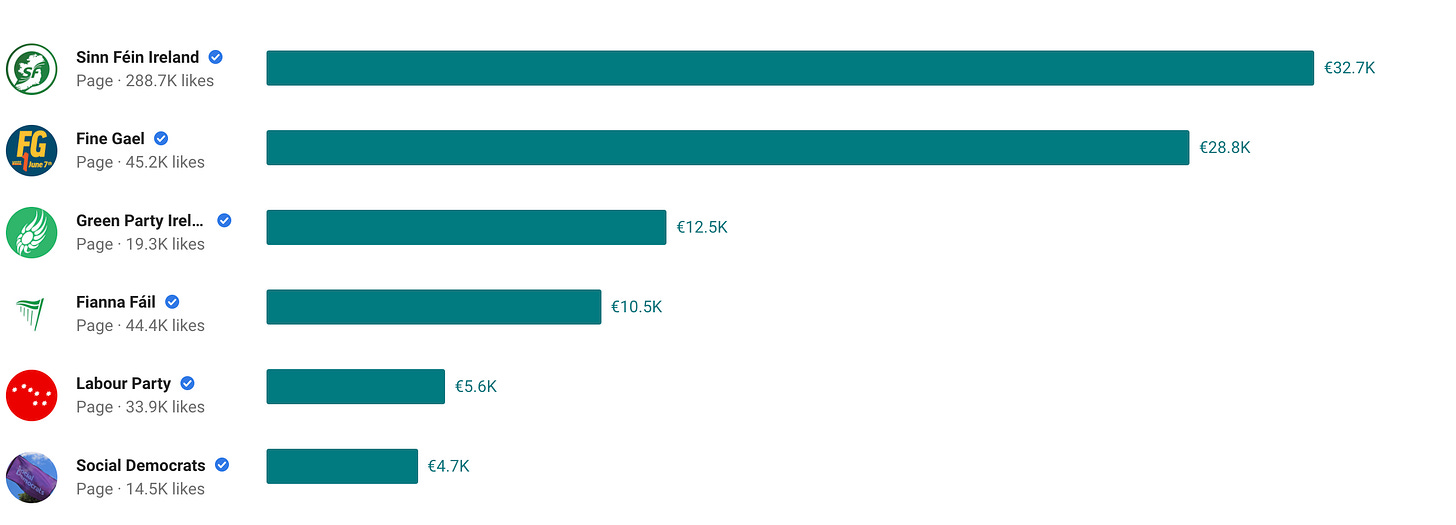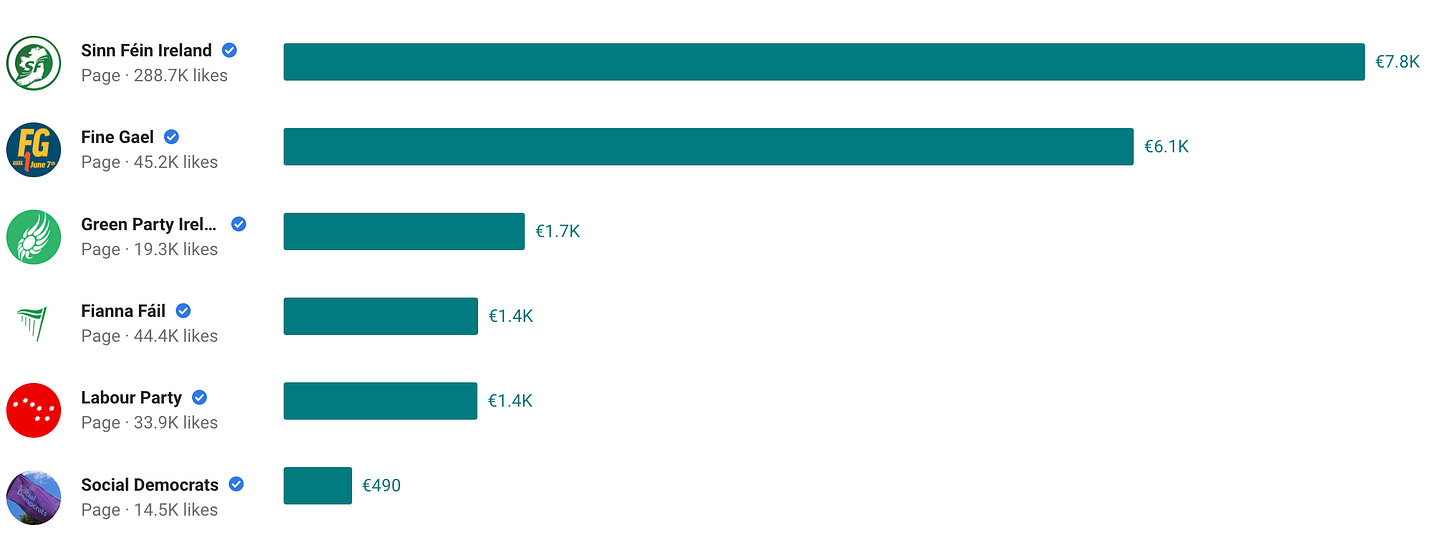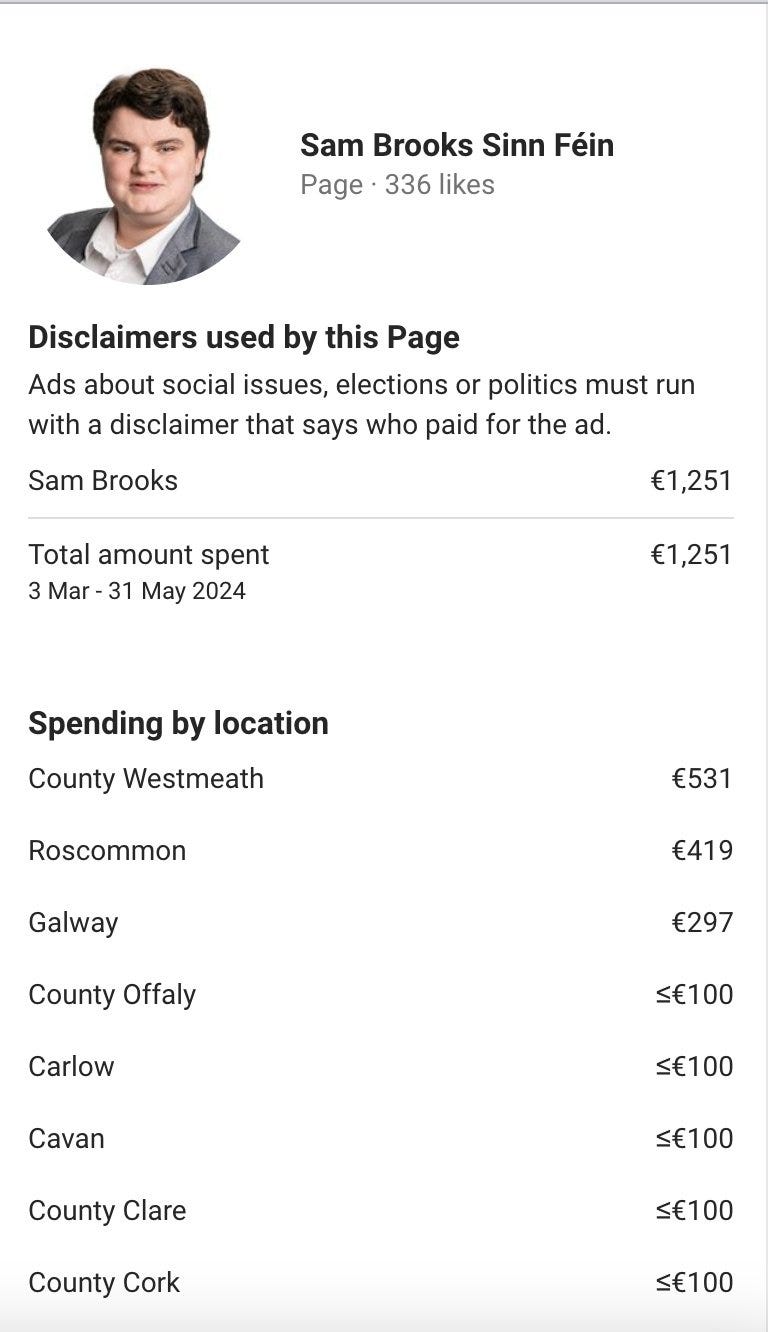Money for Nothin' and the Clicks Are not free
META advertising by political parties during the local and European campaigns.
Political campaigns have become increasingly costly to the point where significant amounts of cash are required even for wildly unsuccessful campaigns, as evidenced by the recent collapse of the Sinn Féin vote share in the local and European elections.
Sinn Féin's vote share dropped by 12.6% compared to the 2020 General Election. Despite spending a substantial €118,531 on Facebook and Instagram advertising in the ninety days leading up to the vote, and an additional €32,745 in the final week alone, the party only secured 11.8% of the first preference votes.
My first thoughts were did Sinn Féin rob a bank, stop laughing down the back! They have money to burn, probably the Northern Bank money. Still, if Sinn Fein is this useless with their own money imagine how useless they will be with your money if they are in Government.
Once people knew Sinn Féin had the money to spend and that they were willing to spend it, then the rest of the Irish political establishment started throwing money at Facebook advertising as well.
Party headquarters collectively spent €230,625 on Facebook advertising in the past three months. Sinn Féin alone accounted for more than 50% of this spending, which was higher than the combined Facebook ad spending of all other political parties.
In the final week, the main political parties rushed to catch up with Sinn Féin.
On the day of the vote, the main parties spent nearly €20,000 on Facebook advertising. The broadcast moratorium, which currently prevents television and radio broadcasters from reporting on elections or referendums from 2 pm on the day before the polls open until after they close, seems outdated. It should be scrapped or amended to reflect the new digital landscape
There’s a small problem with that kind of flagrant spending on Facebook advertising, it doesn’t work for local elections, particularly in Ireland. All politics is local, and in Ireland, very local. Our voting system of PR–STV combined with the relatively tiny local electoral areas compared with other countries has all kinds of variables that Facebook algorithms will struggle with.
Take 18-year-old Sam Brooks running for Sinn Fein in Roscommon. But most of his advertising ended up in the neighbouring counties of Westmeath and Galway. Something that was repeated in all parties across all counties.
Sam eventually ended up spending €1,799 on Facebook advertising for his local election campaign. He garnered 515 first-preference votes, spending €3.50 for every first-preference vote he got. This is not as bad a return as poor Paddy Kevane in Tralee, who spent €2,062 on Facebook advertising for 366 1st preference votes. He spent €5.63 for every 1st preference vote he got. He’d have been better off going around the town buying pints instead of likes.
So why does Facebook advertising fail when spending that much money?
Muddy Messaging: Your ads are as clear as mud. They mumble and fumble through the platform, values, and goals. Viewers? They don’t get it. Your grand campaign vision? Change. Sinn Féin keeps shouting “change”. But what are they looking to change? The child’s nappy? The flat tyre? One of the teen’s moods hopefully? No one knows what they mean by change. Maybe they should start with their party leader.
Ad Nauseam: Advert after advert after advert – until viewers are ready to gouge their own eyes out with a rusty spoon. The same tired message over and over until people would rather watch two flies crawling up a wall. Engagement plummets as ad fatigue sets in. Sinn Fein ran the same ads over and over and they were everywhere.
Political campaigning is a minefield, and party leaders and candidates are stepping on mines all the time. Weak leadership performances? People don’t know what you stand for? Sinn Féin had all that. Your ads are dead on arrival, buried under a landslide of negative sentiment.
Cutthroat Competition: It’s a bloodbath out there. Say you’re one of the seven left-wing parties with elected representation. How do you stand out from the other six? Seven of you duking it out in the digital coliseum. You’re just another left wing gladiator fighting for scraps of attention. Stand out? Good luck – you’re drowning in a sea of noise. That’s why your ads need to be exceptional.
Algorithmic Whiplash: Facebook's algorithms change more often than a teenager’s mood. One day you're riding high hitting all your targets, the next your reach is strangled by some mysterious update. Optimisation? It's a moving target that you’re always chasing.
Facebook advertising can be an effective tool for political campaigns to reach and engage with a large audience. It allows for targeted messaging and can help campaigns reach specific demographics, regions, or interests. However, the effectiveness of Facebook advertising for political purposes can depend on various factors such as campaign strategy, messaging, targeting, and overall public sentiment. If the sentiment isn’t going your way then people are not going to watch your €118,531 worth of Facebook adverts.






